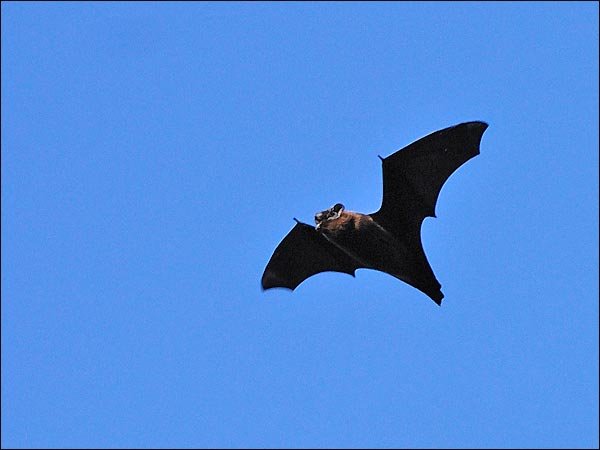Watch The sound of the famous Azorean bats. A night recording. video on DTube
In this 1 minute and pitch black video you will here the sound of the famous bat which makes it's rounds through the night sky. It is a lucky capture because after 30 seconds the first bat came around and sang. Enjoy this field recording. @shla-rafia nature sounds 2017
I found out that its name is Azores noctule (from Wikipedia):
Azores noctule
The Azores noctule (Nyctalus azoreum) is a species of bat found in the dry forests of the Azores. It is the only species of mammal endemic to the Azores. It has been recorded on most of the islands of the Azores, and remains common on some but is rare on others. Its numbers are threatened due to habitat loss caused by humans, and the remaining populations are quite fragmented. It is known to roost in hollowed-out trees, buildings, and caves.
Scientific classification
Kingdom: Animalia
Phylum: Chordata
Class: Mammalia
Order: Chiroptera
Family: Vespertilionidae
Genus: Nyctalus
Species: N. azoreum
Binomial name: Nyctalus azoreum
Thomas, 1901
The species is related to the widespread lesser noctule, and in the past was treated as a subspecies of that species. Genetic studies have found that it originated recently from lesser noctules which colonised the Azores, and has low levels of genetic divergence from its parent species. It nevertheless is much smaller than the lesser noctule and weighs less, has darker fur and has a different frequency of echolocation calls (about 4–5 Hz higher), and is usually treated as a separate species.
The Azores noctule is the only known species of bat in the world that hunts insects principally by day, although a single population of the soprano pipistrelle in northern Italy has also been discovered doing so. It has been hypothesised that the Azores noctules can forage during the day due to the absence of avian predators in the Azores, since it is thought that other bats forage nocturnally in order to avoid predatory birds such as hawks and falcons. Azores noctules still seem to exhibit some anti-predator behaviour, such as leaving their roosting sites in groups, but this may be related to foraging behaviour or non-avian predators such as rats.

Very unique sound recording. Thanks !
Downvoting a post can decrease pending rewards and make it less visible. Common reasons:
Submit
Thanks, I know. The bat was very close and maybe it is Dolby Atmos. Don't know if the cam app picked it up correctly.
Downvoting a post can decrease pending rewards and make it less visible. Common reasons:
Submit
It's a very unique sound. I downloaded it and turned it up in my recording software. I'm thinking of mixing it into the music track of one of my sound poems in the future. I'll definitely let you know and credit you :)
Downvoting a post can decrease pending rewards and make it less visible. Common reasons:
Submit
Perfect! :)
Downvoting a post can decrease pending rewards and make it less visible. Common reasons:
Submit
@shla-rafia got you a $1.64 @minnowbooster upgoat, nice! (Image: pixabay.com)
Want a boost? Click here to read more!
Downvoting a post can decrease pending rewards and make it less visible. Common reasons:
Submit
This post has received a 12.88 % upvote from @booster thanks to: @shla-rafia.
Downvoting a post can decrease pending rewards and make it less visible. Common reasons:
Submit
Whooooaaaaaa!!! its so strange?
Downvoting a post can decrease pending rewards and make it less visible. Common reasons:
Submit